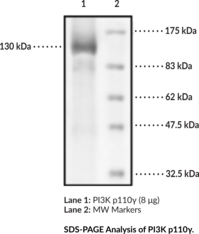Territorial Availability: Available through Bertin Technologies only in France
- Correlated keywords
- p120PI3K p-120 PI3K? 101 87 84 110
- Product Overview:
Class I phosphatidylinositol 3-kinases (PI3Ks) are membrane-associated lipid kinases with roles in membrane trafficking during autophagy, endosome recycling, and endocytosis, adaptive and innate immune cell activation, and leukocyte chemotaxis, as well as various diseases.{57716,57715,57717} They are heterodimeric enzymes composed of a p110 catalytic subunit and a regulatory subunit and act on three substrates, non-phosphorylated phosphatidylinositol (PI), inositol monophosphate (PI(4)P), and inositol bisphosphate (PI(4,5)P2), to generate PI(3)P, PI(3,4)P2, and PI(3,4,5)P3, respectively.{57716,57715} The PI3K catalytic isoform p110? forms a complex with the regulatory subunits p101 or p87, also known as p84, and is selectively controlled by G protein-coupled receptors to regulate signaling.{57716} It is widely expressed, with high levels in cells of immune and hematopoietic origin, and dysregulation of p110? expression is associated with tumorigenesis and invasion in various solid tumors. The gene encoding PI3K p110?, PIK3CG, is located within the autism susceptibility locus, and SNPs in PIK3CG have been found in patients with the autism spectrum disorder tuberous sclerosis.{57714} Inhibition of PI3K p110? with small molecule inhibitors reduces joint inflammation and destruction in mouse models of rheumatoid arthritis, as well as reduces migration and accumulation of eosinophils in a mouse model of allergic pleurisy.{57717} Cayman’s PI3K p110? (human, recombinant) protein can be used for binding assays.
Cayman Chemical’s mission is to help make research possible by supplying scientists worldwide with the basic research tools necessary for advancing human and animal health. Our utmost commitment to healthcare researchers is to offer the highest quality products with an affordable pricing policy.
Our scientists are experts in the synthesis, purification, and characterization of biochemicals ranging from small drug-like heterocycles to complex biolipids, fatty acids, and many others. We are also highly skilled in all aspects of assay and antibody development, protein expression, crystallization, and structure determination.
Over the past thirty years, Cayman developed a deep knowledge base in lipid biochemistry, including research involving the arachidonic acid cascade, inositol phosphates, and cannabinoids. This knowledge enabled the production of reagents of exceptional quality for cancer, oxidative injury, epigenetics, neuroscience, inflammation, metabolism, and many additional lines of research.
Our organic and analytical chemists specialize in the rapid development of manufacturing processes and analytical methods to carry out clinical and commercial GMP-API production. Pre-clinical drug discovery efforts are currently underway in the areas of bone restoration and repair, muscular dystrophy, oncology, and inflammation. A separate group of Ph.D.-level scientists are dedicated to offering Hit-to-Lead Discovery and Profiling Services for epigenetic targets. Our knowledgeable chemists can be contracted to perform complete sample analysis for analytes measured by the majority of our assays. We also offer a wide range of analytical services using LC-MS/MS, HPLC, GC, and many other techniques.
Accreditations
ISO/IEC 17025:2005
ISO Guide 34:2009
Cayman is a leader in the field of emerging drugs of abuse, providing high-purity Schedule I-V Controlled Substances to federally-licensed laboratories and qualified academic research institutions for forensic analyses. We are certified by ACLASS Accreditation Services with dual accreditation to ISO/IEC 17025:2005 and ISO Guide 34:2009.





